A parent’s love knows no boundaries. A father would cross to the ends of the earth if it meant his daughter could be happy, but what if it is not love driving him, but instead guilt? In a 1960 thriller based on the novel, Les Yeux Sans visage, or Eyes Without a Face, director Georges Franju visually displays the unsettling story about a girl who must wear a mask that covers everything but her eyes due to her face being disfigured from a car crash. The car crash was all thanks to her father, who was driving that night. Luckily for her, he’s a surgeon and won’t stop until his daughter’s face returns to normal. Without regard to her wishes, he desperately tries to find a new face for her, even if it means murder. Franju pushes the thriller genre boundaries by intertwining love, peace, and guilt into one twisted story about parental love.
Eyes Without a Face is a fictional film shot in black and white. When it was first shown at the Edinburgh Film Festival, some audience members had to leave because of the graphic surgery scenes, and I myself had to cover my eyes when those scenes played. I am not one for blood and guts and certainly not one for the skinning of a human being. It is not for the faint of heart, but is tame compared to a Tarantino film. As shocking as it was for audiences, it was no new feat for Franju, who consistently made films that questioned physical morality.
At the beginning of the film a woman named Louise, played by Alida Valli, is driving a car with someone in the back seat. Their face is deformed, but we don’t see enough of it to tell what happened to the body, assuming they are dead or knocked out cold. The music almost reminds me of the same music played in Wizard of Oz when Dorothy see’s the Wicked Witch in the tornado – it’s very menacing. Similar music is played later when Louise is tricking a girl into coming to the mansion to become a new test subject, making it feel like her theme song. I like that the film started with such a strong hook. We have no idea who the body is and why Louise is dragging it to the river to dispose of it. Plus, Louise doesn’t look like the type of woman involved in such heinous acts. Her outfit is made of nice clothing, and she is blatantly scared while committing the act. We come to find out she is the assistant of Dr. Génessier, played by Pierre Brasseur. Louise had skin grafting done on her own body and covers the scar with a chunky pearl necklace, which explains her loyalty to him – a commitment that includes dumping the test subjects’ bodies. As the movie progresses, it’s clear Louise has been with the Génessier’s for a long time. She treats Christiane, played by Edith Scob, with compassion and seems to replace the family’s missing mother figure, but there are no signs of romantic interest from Dr. Génessier.
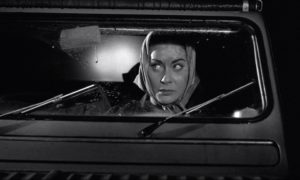
Louise in the car bringing a body to the lake.
One thing that stood out to me was the costuming choices. Christiane has to wear an uncanny mask which is so form-fitting to her face that you could see the wrinkles in her lips. She also wears a strange coat that has an oversized collar and is flared up, making her look like a super-villain. It covers her entire body from her neck to her ankles, and the silhouette is a cone shape, so you don’t see what the rest of her body looks like until she receives a new face. Later she wears a similar dress, but it seems like it’s made out of the fabric from hospital gowns. It makes it a bit more disturbing that, for the most part, Christiane appears to be treated as a prisoner in her own home and has no control over her physical appearance. She wanders around the vast mansion quietly as if, if somebody were to find her, they would exile her back to her room.
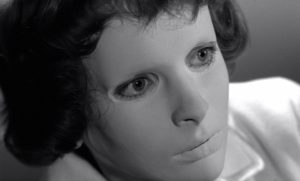
Christiane’s mask.
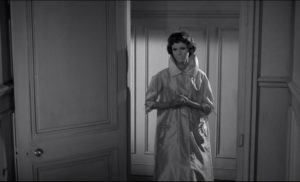
Christiane’s coat.
On the other hand, her father, Dr. Génessier, roams freely except for the weight of his massive guilt. It’s almost like Christiane has become just another one of his experiments. She hasn’t had just the one skin graft, but several. Every time they tried, her body started to reject the skin, leaving Dr. Genessier more frustrated and Christiane more dismayed. He says he is afraid and acknowledges that he has done wrong, but I had to wonder: is he terrified for Christiane, or is he more fearful that his expertise will fail again? I believe that until he has fixed Christiane, his guilt will not subside, and that’s why he is so overbearing when it comes to the surgeries.
Low-key lighting and the strong contrast between the black and white create an eerie tone to the mansion at night. There are not many non-diegetic sounds used throughout the film, so the sound of footsteps echoing through the empty house is daunting. When Edna, played by Juliette Mayniel, wakes up from her surgery and escapes her room, the mansion suddenly becomes a maze. She runs up the multiple staircases, through long hallways, and into rooms without knowing what’s behind them. Part of a good thriller is to create a location that in itself can become a labyrinth for the characters, but for poor Edna, she falls to her death by trying to escape through a window. There is a close up of her face, her eyes wide open while blood is seeping from her head. I think that the film’s name resonates with Christiane in some ways, but mainly for the victims. The bandages cover everything on their face besides their eyes and mouth, so you could say that they are the eyes without a face.
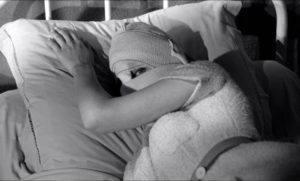
Edna (Juliette Mayniel) after her unwanted surgery.
The ending takes a morbid turn when the police finally start tracking down where all the missing girls went, leading them to Dr. Génessier. They send in a girl who will work as an insider to see if Dr. Genessier takes her hostage. As such, Dr. Genessier falls into their trap and takes the girl down to the garage’s surgery room. Christiane is already there, patiently waiting for her father’s return to start the surgery. Without a word, she calmly releases the girl who has woken up from her anesthetics. With a simple shake of her head, rejecting Louise’s authority, Christiane kills Louise by stabbing her in the neck and frees the dogs that her dad kept in cages as test subjects. In turn, when her father comes back to the house and hears the dogs barking, he opens the door only to get mauled to death. Christiane leaves the house and walks into the woods with a dove on her hand, symbolizing her true freedom from her father’s tyranny. Her peculiar dress flows more than the first one– that looked more like a frilly straitjacket– but it adds to the uncanny, mysterious affect of seeing someone in a mask walking in the forest with doves flying around them.
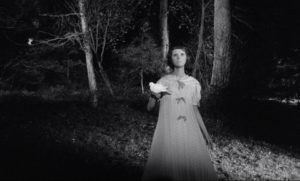
Christiane walking away into the woods with a Dove.
Eyes Without a Face surely does accomplish the chilling aspects of a thriller through its characters and mise-en-scene. Franju provides clear images of what peace and love should look like through Christiane’s morality and how ethics can easily become twisted from a father who thinks he is acting out of love.


Recent Comments